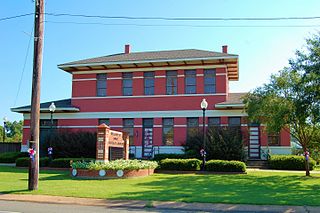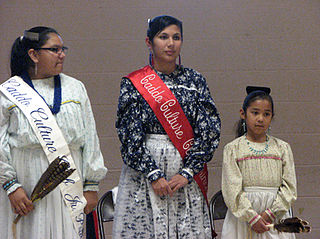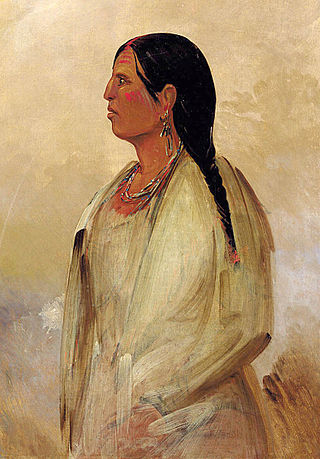
The Choctaw are a Native American people originally based in the Southeastern Woodlands, in what is now Mississippi and Alabama. The Choctaw language is a Western Muskogean language. Today, Choctaw people are enrolled in four federally recognized tribes: the Choctaw Nation of Oklahoma, Mississippi Band of Choctaw Indians, Jena Band of Choctaw Indians in Louisiana, and the Yowani Choctaws enrolled under the confederacy of the Caddo Nation. Choctaw descendants are also members of state-recognized tribes.

Indian Territory and the Indian Territories are terms that generally described an evolving land area set aside by the United States government for the relocation of Native Americans who held original Indian title to their land as an independent nation-state. The concept of an Indian territory was an outcome of the U.S. federal government's 18th- and 19th-century policy of Indian removal. After the American Civil War (1861–1865), the policy of the U.S. government was one of assimilation.

Avoyelles is a parish located in central eastern Louisiana on the Red River where it effectively becomes the Atchafalaya River and meets the Mississippi River. As of the 2020 census, the population was 39,693. The parish seat is Marksville. The parish was created in 1807, with the name deriving from the French name for the historic Avoyel people, one of the local Indian tribes at the time of European encounter.

The Mardi Gras Indians are African American carnival revelers in New Orleans, Louisiana, known for their elaborate suits and participation in Mardi Gras. The Mardi Gras Indians subculture emerged during the era of slavery from West African, Afro-Caribbean and Native American cultural practices. The Mardi Gras Indians' tradition is considered part of the African diasporan decorative aesthetic, and is an African-American art form.

The Caddo people comprise the Caddo Nation of Oklahoma, a federally recognized tribe headquartered in Binger, Oklahoma. They speak the Caddo language.
The Chitimacha are an Indigenous people of the Southeastern Woodlands in Louisiana. They are a federally recognized tribe, the Chitimacha Tribe of Louisiana.
The Tunica-Biloxi Indian Tribe, formerly known as the Tunica-Biloxi Indian Tribe of Louisiana, is a federally recognized tribe of primarily Tunica and Biloxi people, located in east central Louisiana. Descendants of Ofo (Siouan-speakers), Avoyel, and Choctaw are also enrolled in the tribe.

The Adai were a Native American people of northwestern Louisiana and northeastern Texas. They were an Indigenous people of the Southeastern Woodlands and part of the Caddo Confederacy.

The Houma are a historic Native American people of Louisiana on the east side of the Red River of the South. The United Houma Nation, who identify as descendants of the Houma people, have been recognized by the state as a tribe since 1972, but are not recognized by the federal government.

Indigenous peoples of the Southeastern Woodlands, Southeastern cultures, or Southeast Indians are an ethnographic classification for Native Americans who have traditionally inhabited the area now part of the Southeastern United States and the northeastern border of Mexico, that share common cultural traits. This classification is a part of the Eastern Woodlands. The concept of a southeastern cultural region was developed by anthropologists, beginning with Otis Mason and Franz Boas in 1887. The boundaries of the region are defined more by shared cultural traits than by geographic distinctions. Because the cultures gradually instead of abruptly shift into Plains, Prairie, or Northeastern Woodlands cultures, scholars do not always agree on the exact limits of the Southeastern Woodland culture region. Shawnee, Powhatan, Waco, Tawakoni, Tonkawa, Karankawa, Quapaw, and Mosopelea are usually seen as marginally southeastern and their traditional lands represent the borders of the cultural region.
State-recognized tribes in the United States are organizations that identify as Native American tribes or heritage groups that do not meet the criteria for federally recognized Indian tribes but have been recognized by a process established under assorted state government laws for varying purposes or by governor's executive orders. State recognition does not dictate whether or not they are recognized as Native American tribes by continually existing tribal nations.
The Avoyel or Avoyelles were a small Native American tribe who at the time of European contact inhabited land near the mouth of the Red River at its confluence with the Atchafalaya River near present-day Marksville, Louisiana. The Avoyel are a member of the federally recognized Native American tribe and sovereign nation of the Tunica Biloxi Tribe of Louisiana.

The Coushatta are a Muskogean-speaking Native American people now living primarily in the U.S. states of Louisiana, Oklahoma, and Texas.
The Mosopelea, or Ofo, were a Siouan-speaking Native American people who historically lived near the upper Ohio River. In reaction to Iroquois Confederacy invasions to take control of hunting grounds in the late 17th century, they moved south to the lower Mississippi River. They finally settled in central Louisiana, where they assimilated with the Tunica and the Siouan-speaking Biloxi. They spoke the Ofo language, generally classified as a Siouan language.
The Taensa were a Native American people whose settlements at the time of European contact in the late 17th century were located in present-day Tensas Parish, Louisiana. The meaning of the name, which has the further spelling variants of Taenso, Tinsas, Tenza or Tinza, Tahensa or Takensa, and Tenisaw, is unknown. It is believed to be an autonym. The Taensa should not be confused with the Avoyel, known by the French as the petits Taensas, who were mentioned in writings by explorer Pierre Le Moyne d'Iberville in 1699. The Taensa are more closely related to the Natchez people and both are considered descendants of the late prehistoric Plaquemine culture.

The Coushatta Tribe of Louisiana is one of three federally recognized tribes of Koasati people. They are located in Allen and Jefferson Davis Parishes, Louisiana. The tribe hosts an annual pow wow during the second weekend in June.
The Natchitoches are a Native American tribe from northwestern Louisiana and Texas. They organized themselves in one of the three Caddo-speaking confederacies along with the Hasinai, and Kadohadacho.
The Alabama–Quassarte Tribal Town is both a federally recognized Native American tribe and a traditional township of Muskogean-speaking Alabama and Coushatta peoples. Their traditional languages include Alabama, Koasati, and Mvskoke. As of 2014, the tribe includes 369 enrolled members, who live within the state of Oklahoma as well as Texas, Louisiana, and Arizona.
The Ouachita were a Native American tribe who lived in northeastern Louisiana along the Ouachita River.

The Tunica people are a group of linguistically and culturally related Native American tribes in the Mississippi River Valley, which include the Tunica ; the Yazoo; the Koroa ; and possibly the Tioux. They first encountered Europeans in 1541 – members of the Hernando de Soto expedition.










